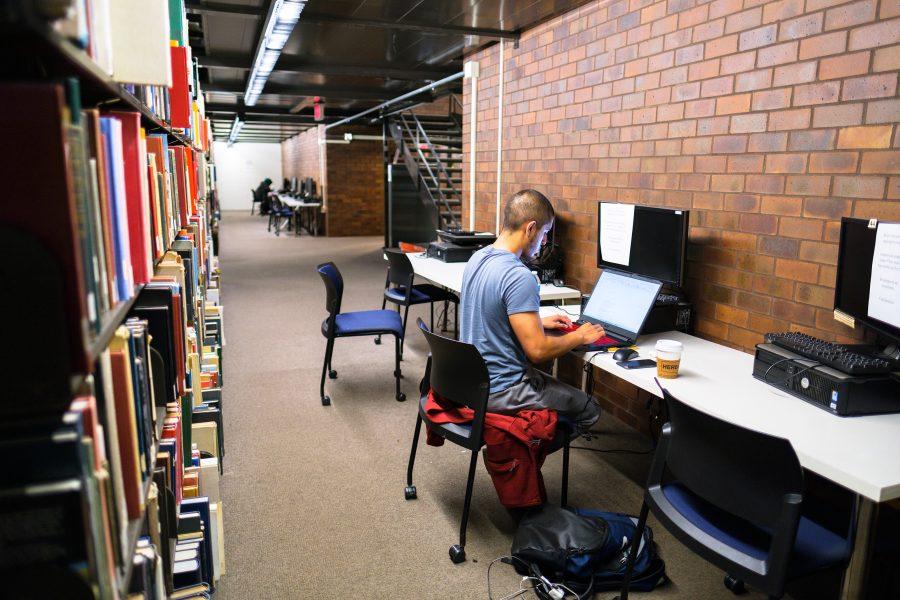A student works on homework in UMass Boston’s Healey Library.
As you read the title, it probably made you think of all the times you scrolled through social media, visited online shops, ate junk food…or done anything else to delay starting that one assignment. The word procrastination often carries a negative connotation, and I’m not here to deny that. It is a struggle that many of us have faced since we gained responsibilities and one of the biggest enemies to work-productivity.
As someone who periodically juggles anxiety and depression, procrastination is the response I have for anything that requires the tiniest stroke of work. Even through all the self-help books and the advice from mentors on how to overcome it, I still sometimes find myself delaying my work until I have that spark of motivation. However, in a recent experience where I guiltily spent almost an hour putting off an assignment with a looming deadline, things were different. When I finally started working on the assignment, I had a clearer vision which became corporeal; material productively flowed from my fingers into the computer.
According to Creativity Collective by BBC Production, it is psychologically evident that you’re more likely to have insightful and creative ideas if you engage in something completely different from the work that you’re supposed to do. They claim that having a period of so-called “incubation” helps you to untie yourself consciously from the problem that you’re attached to and allows your unconscious mind to wander. This allows you to come up with a solution from a whole new perspective. (1) This means that it works best when you’re engaged in an activity that is relaxing but also requires some sort of focus.
Through my hour of mindlessly scrolling through social media and checking emails, I allowed myself to take a mental break while not being so psychologically fixated on the task I was trying to do. By having that period of incubation, my brain was revitalizing itself and generating new ideas backstage, which explains my feeling of motivation and sudden energy to tackle the work.
In the book “Think Again: The Power of Knowing What You Don’t Know,” Adam Grant—who is a professor at The Wharton School of the University of Pennsylvania—talks about how “non-conformists” succeed and move the world.(4) He found that most people procrastinate and come up with their most creative and original ideas at the last minute. Martin Luther King Jr. was a notorious procrastinator, who was still rewriting his famous “I Have a Dream” speech the night before. Even as he was already on stage, he abandoned the prewritten script and improvised those famous four words that changed history.(2)
In a business experiment, which Grant designed, three groups of people were asked to create business ideas and then have strangers rate their creativity. One group that played Minesweeper before working on the task was, according to Grant, “16 percent more creative” than the rest of the subjects, who either did not procrastinate or procrastinated for a longer time. (2) “When you procrastinate, you’re more likely to let your mind wander. That gives you a better chance of stumbling onto the unusual and spotting unexpected patterns,” Grant explained in an article for the New York Times. (3) However, in order to receive this result, you should only procrastinate for a moderate amount. In the experiment conducted, only the group that procrastinated for 5-10 minutes showed the most creativity. The ones that procrastinated for more than 10 minutes had more similar results to the ones that didn’t at all.(2)
In today’s society, productivity and crossing out every task on the to-do list within a certain time frame is what defines success. However, as humans who already have to go through all the obstacles and stumbling blocks in life, it is harmful, if not detrimental, to conform to that sort of ideology.
If you feel exhausted from a whole day of running from class to class, you don’t necessarily have to hold yourself strictly to societal standards, or your parents’ standards, of productivity. Take a moment to recognize all your hard work and give yourself a moment to relax. That YouTube vlog with impeccable daily routine and motivational speeches isn’t going to get you out of the procrastination cycle either. “Perfectionism is the enemy of progress,” says Winston Churchill. We need to be mindful, and more importantly, be kind to ourselves when it comes to productivity. Letting your brain rest and wander, giving it the freedom to generate ideas, is the panacea to doing your best work.
So, if you’re really struggling to get started on that assignment, don’t be too hard on yourself. Instead, try to find the source of it. There usually is always a reason to procrastinate. For me, it stems from my anxiety and the fear of not doing good enough. Once I recognize that, I would take action to cure the feeling of procrastination internally instead of forcing myself with self-discipline.
Crossing out everything on the to-do list doesn’t determine success. “Invention, in my opinion, arises directly from idleness, possibly also from laziness,” says famous writer Agatha Christie. It is important to recognize your mental state and let your mind rest before allowing it to generate creativity and achieve your best work.
-
BBC/Creative Collective: https://www.bbc.com/worklife/article/20210319-why-procrastination-can-help-fuel-creativity
-
TED TALK – The surprising habits of original thinkers: https://www.ted.com/talks/adam_grant_the_surprising_habits_of_original_thinkers?language=en
-
NYT opinion; https://www.nytimes.com/2016/01/17/opinion/sunday/why-i-taught-myself-to-procrastinate.html

